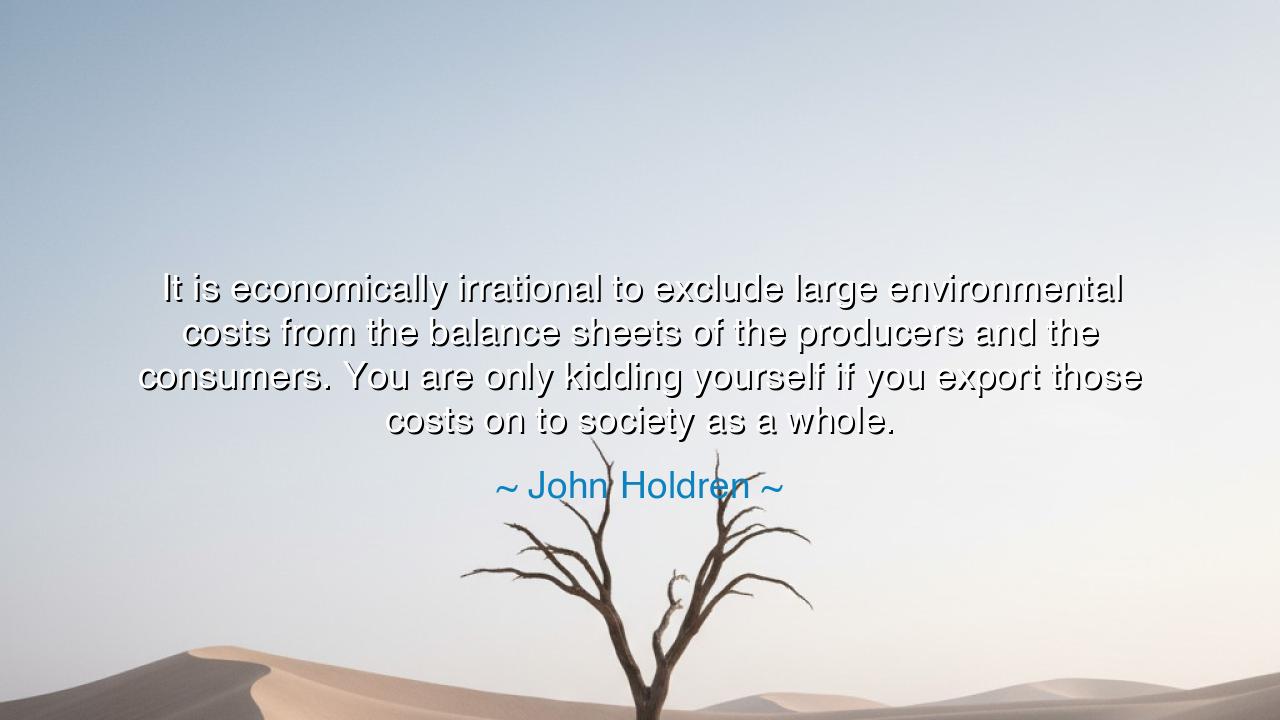
It is economically irrational to exclude large environmental
It is economically irrational to exclude large environmental costs from the balance sheets of the producers and the consumers. You are only kidding yourself if you export those costs on to society as a whole.






Hear, O seekers of wisdom, the voice of John Holdren, who declared with clarity: “It is economically irrational to exclude large environmental costs from the balance sheets of the producers and the consumers. You are only kidding yourself if you export those costs on to society as a whole.” This is no common utterance, but a pronouncement of truth as old as justice itself. For in these words we are reminded that the earth is no ledger to be ignored, no treasury with infinite supply, but a living account that must be reckoned with. To deny this is to deceive oneself, as a man who covers his eyes before the rising flood, imagining he is safe because he cannot see the waters.
The heart of this teaching is clear: when producers exploit the land, when consumers demand without thought, and when both cast aside the hidden burdens of pollution, waste, and destruction, the price is not erased—it is merely shifted. It falls upon the poor who breathe foul air, upon the sick whose bodies weaken, upon the children who inherit deserts where forests once grew. This is the folly Holdren calls irrational—the illusion that one can enjoy profit without cost, that one may feast without paying the debt owed to the world that sustains the feast.
History itself offers grim testimony. In the age of the Industrial Revolution, factories rose like iron mountains across England. Their fires forged wealth, yet the skies darkened with soot, and rivers ran black with poison. The balance sheet of the mill owners showed profit, yet the hidden account of the people bore the deficit: children working until their lungs collapsed, families living beneath a pall of smoke, villages choking on the very prosperity they had been promised. The producers and the consumers believed they had triumphed, but the nation awoke to discover the cost had merely been delayed, and it was the society at large that bore the wounds.
Nor is this tale locked in the past. In our own time, let us remember the tragedy of Bhopal in India, when toxic gas leaked from a pesticide plant in 1984. The company had calculated profit, yet it had not counted the environmental costs of negligence. Thousands perished, tens of thousands were scarred for life. The costs were not on the corporate ledger, but they were burned into the bodies of the people and the soil of the land. This is the cruel arithmetic Holdren warns against: when costs are denied, they do not vanish—they are merely exported onto the innocent.
Learn from these stories, O listener, that the economy is not an island apart from the earth, but a vessel floating upon it. If one drills holes in the hull to lighten the burden of accounts, the ship will sink, and all aboard will drown together. The illusion of cheapness, the lie of "externalities," is a deception that blinds the eye and poisons the future. True rationality demands we reckon with every cost, seen and unseen, and pay our debts to the earth in full.
Let this be the lesson: greatness in trade, in governance, in life itself, lies not in shifting burdens to others but in bearing them with fairness. Producers must account for what they take; consumers must reflect on what they demand. To buy wisely, to waste little, to demand goods that do not scorch the soil nor choke the sky—these are the noble acts of the modern age.
Therefore, O children of tomorrow, act with resolve. Support those who measure their profit not merely in coin but in the health of rivers and the purity of air. Question the price of what you consume, not only in money, but in the life it costs the earth. Reduce what you waste, cherish what you hold, and lift your voice for policies that bind all to the true balance sheet of creation.
For the earth does not forget, nor does it pardon the debts of folly. It collects, always. And only by acknowledging its costs with honesty and courage can humanity walk the path of prosperity that endures, not only for the few, but for all generations yet to come.






AAdministratorAdministrator
Welcome, honored guests. Please leave a comment, we will respond soon